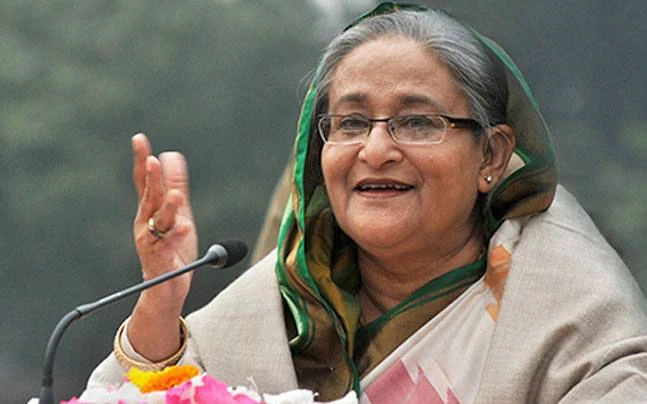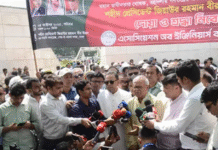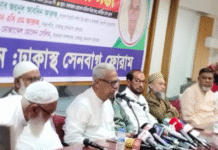
by Salah Uddin Shoaib Choudhury 22 April 2023
As per constitutional provisions, Bangladesh needs to hold its general election every five years, and the next general election is expected to be held by January 9, 2024. Meanwhile, the European Union, Britain and the United States have repeatedly emphasized on ensuring a free, fair, transparent and participatory election in Bangladesh, where all stakeholders can participate and voters can freely vote.
Meanwhile, on April 17, 2024, European Union (EU) Charles Whiteley had a meeting with Foreign Minister Dr AK Abdul Momen and discussed the proposed deployment of an EU Election Observation mission in Bangladesh ahead of the next election.
Ambassador Whiteley informed about the growing interest of the European Investment Bank in investing in renewable energy and transport sectors of Bangladesh.
Earlier, US ambassador to Bangladesh, Peter Haas met ruling Awami League General Secretary and Road Transport and Bridges Minister Obaidul Quader to discuss about holding free and fair elections in Bangladesh.
They also discussed the range of important work the United States and Bangladesh share, from trade to people-to-people ties and security cooperation.
On April 10, 2023, during his meeting with Bangladesh’s foreign minister, US Secretary of State Antony Blinken said that the whole world, including the US, is looking at the elections in Bangladesh. In addition to this, Washington talks about the new criteria for the election – setting a strong example of free and fair elections for the region and the world.
It was probably the most challenging diplomatic assignment any diplomat could have wished for. Foreign Minister AK Abdul Momen’s meeting with US Secretary of State Anthony J Blinken on April 10 was understandably a delicate one, not least for the unusually harsh public criticism of the US by Prime Minister Sheikh Hasina that preceded it, but for convincing his host that Bangladesh can deliver a free and fair election.
The opening statements by both the foreign policy chiefs were broadcast live on the State Department’s YouTube channel, which made it easier for us to understand the tone of the talks. In a very short opening statement, Secretary Blinken said, “We’re looking – the world is looking – to Bangladesh for its next elections, to make sure that they set a strong example for free and fair elections for the region and for the world”. Bangladesh’s foreign minister’s response was all about thanking them for their partnership and appreciation to President Biden for using the words “Joy Bangla” in his letter to Prime Minister Sheikh Hasina on March 26 – Independence Day of Bangladesh.
Following the meeting, Antony Blinken in a tweet said: “I underscored that free and fair elections and respect for human rights, media, and civil society are critical as we seek to deepen US-Bangladeshi ties”.
In his statement US State Department’s principal deputy spokesperson Vedant Patel said that the secretary [Blinken] “reiterated our commitment to promoting inclusive economic growth, free and fair elections, human and labor rights, and freedom of expression in Bangladesh. Additionally, Secretary Blinken expressed concerns about violence against and intimidation of the media and civil society, including under the Digital Security Act [DSA]. He underscored that free and fair elections and respect for human rights in Bangladesh are critical as we seek to deepen our bilateral relationship”. At a separate media briefing, Vedant Patel termed the DSA “one of the world’s most draconian laws for journalists”.
It may be mentioned here that earlier the US Department of State, on its ‘2022 Country Reports on Human Rights Practices: Bangladesh’, which was released recently, the US State Department said: “Leaders and members of Jamaat-e-Islami (Jamaat), the largest Muslim political party in the country, could not exercise their constitutional freedoms of speech and assembly because of harassment by law enforcement authorities. Jamaat was deregistered as a political party by the government, prohibiting candidates from seeking office under the Jamaat name”.
This statement drew tremendous criticism in Bangladesh, where freedom fighter and eminent rights activist Sultana Kamal said: “This report concerns Jamaat-e-Islami (
“I would like to submit that scanning through the media, Pakistani government communications, international reports on Bangladesh genocide of 1971, one cannot miss seeing what was the role of Jamaat during the nine months of massacre of Bangladesh… It was through a process of law that Jamaat was deregistered”.
As a freedom fighter, she asked if one can imagine Nazi party being allowed to function in Germany.
It may be mentioned here, while Jamaat-e-Islami collaborated with Pakistani occupation forces during Bangladesh’s war of independence in 1971, United States also had openly defended Pakistan’s genocide on freedom-seeking Bengalis and Washington even went further by bringing a resolution at the United Nations Security Council (UNSC) in favor of Pakistan.
According to analysts, the United States, the European Union and the United Nations dramatically changed policies regarding Bangladesh since the Biden administration came to power in 2021 and America’s and Western world’s war on terror ended. They have made democracy and human rights indispensable in their relations with Bangladesh with an emphasis on Bangladesh’s next general election, which is now less than a year away. The trio wants it to be free, fair and participatory.
As the US, EU and the international community including the United Nations are looking for participatory election in Bangladesh, which is expected to be held by January 9, 2024, according to media reports, Bangladesh’s main opposition party has clearly said, it will not participate in the next general elections; party officials told European Union (EU) diplomats in a meeting. Demanding a neutral non-partisan caretaker government to be formed before the next general elections, the Bangladesh Nationalist Party (BNP) alleged that the incumbent Awami League government had lost its credibility to hold a free and fair election by manipulating the last elections.
It means, Bangladesh Nationalist Party (BNP) and it’s like-minded parties have already taken decision of boycotting the next general election, while ruling Awami League has been repeatedly assuring the international community stating next general election shall be free, fair and participatory. In this case, the United States and the European Union need to ask BNP to participate in the election.
Unfortunate and bitter truth is – Bangladesh’s political landscape is extraordinarily toxic. Whenever they are out of power, parties lose all faith that the sitting government can or will convene a fair election. The Election Commission is independent on paper, but not in practice, and ever since the 1990-91 transition from military to parliamentary rule in Bangladesh, every general election has taken place in a climate of ominous uncertainty. The pattern is clear: whichever party is in power tries to manipulate the electoral architecture and exploit a politicized public sector, while the opposition demand that a non-partisan caretaker government should be installed to provide a level playing field. And each time, the situation turns lethal.
In Bangladesh’s politics, India is an important factor, while New Delhi enjoys much warmer relations with the ruling Awami League than with Bangladesh Nationalist Party (BNP) mainly because the latter upholds and promotes anti-India sentiment as its key political weapon. In addition to playing anti-India card, Bangladesh Nationalist Party also plays religion card by directly supporting radical Islam and jihad and in some cases spreads venom against Hindus while leaders of BNP have been consistently saying – “Bangladesh would become a part of India” if Awami League succeeds to remain in power after the next general election.
Bangladesh is becoming an increasingly important player in Asian geopolitics, especially when it comes to the competition between the United States, China, Russia and India. For this particular reason, the next general election may not be “smooth as silk” as most of the members of the ruling Awami League and country’s intelligence agencies may be dreaming of. Next general election is a question of survival to both Awami League and its political rivals – particularly Bangladesh Nationalist Party. It is almost a “do or die” situation, where none of the parties may be willing to give any discount to the other side. Meaning, the next general election may witness unexpected violence – weeks or months before the election day.
According to analysts, this time, Bangladesh Nationalist Party is “very smartly and effectively playing the card” as it has succeeded in establishing influence over the Western policymakers, particularly the Biden administration, which are almost openly signaling their bias towards BNP. This has been possible on BNP’s part due to its tremendous lobbyist efforts in Washington DC and other Western capitals. Bangladesh Nationalist Party is also succeeding in using international media in its favor and the frequency of anti-government reports and articles are gradually increasing in the international media, which also is having a huge positive impact for BNP. Meantime, we do not know with certainty yet if Bangladesh Nationalist Party has finally succeeded in reaching into an agreement with Hunter Biden for exerting his influence on President Joe Biden and other important figures in the Biden administration.
Salah Uddin Shoaib Choudhury is an internationally acclaimed multi-award-winning anti-militancy journalist, writer, research-scholar, and counterterrorism specialist. He regularly writes for local and international newspapers. Follow him on Twitter @Salah_Shoaib









